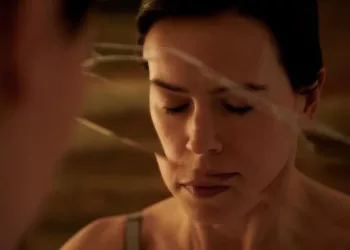All Dirt Roads Taste of Salt marks an extraordinarily accomplished feature debut for writer-director Raven Jackson. The indie drama premiered earlier this year at the Sundance Film Festival, where it drew both rapturous praise and some divisive reactions for its boldly unconventional approach.
At the heart of All Dirt Roads is newcomer Charleen McClure, who stars as Mack, a Black woman whose life in 1970s rural Mississippi unfolds in vivid fragments across the film’s non-linear narrative. We experience tender, tactile memories from her girlhood, turbulent young adulthood, and middle age in lyrical episodes, with the passage of time marked subtly through changes in hairstyle and age.
Guiding us through the poetic visions of Mack’s journey is director Raven Jackson, making her first foray into feature films after establishing herself as a promising talent with several shorts. Jackson wrote the original script and conjures up an immersive, sensory cinematic world for her protagonist’s story to inhabit.
In this review, we’ll examine whether All Dirt Roads Taste of Salt lives up to the incredible promise shown by Jackson as well as the rapturous critical reception from some viewers. Does her unconventional approach succeed in capturing the essence of Mack’s life and identity? Or does the sparse plot fail to connect the elliptical vignettes into a coherent and emotionally resonant whole? Join us as we review this unique indie debut to see if it marks the arrival of an exciting new cinematic voice.
A Life Recollected Through Poetic Fragments
The unconventional narrative of All Dirt Roads Taste of Salt mimics the fluid, non-linear nature of memory itself. Rather than a straightforward plot, writer-director Raven Jackson offers up poetic fragments and tactile moments that collectively capture the essence of protagonist Mack’s life.
We first meet Mack in the 1970s as a young girl in rural Mississippi, learning Patiently alongside her father how to fish and clean a fresh catch. Already Jackson establishes the film’s visceral connection to the natural world through sounds and textures, like fish scales glinting in the sun.
From there the story skips across decades, with episodic glimpses at different stages of Mack’s life mediated by actress Charleen McClure’s nuanced performance. The timeline is marked subtly through changes in Mack’s braided hairstyles and age, as well as the presence of certain characters.
Throughout these elliptical scenes, some defining relationships emerge. We see Mack’s close bond with her mother Evelyn, beautifully played by Sheila Atim, whether as a child enthralled watching her dance or later mourning at her funeral. Her sister Josie, portrayed by Moses Ingram, is a quiet but loyal presence, from bathing Mack’s baby to companionably fishing by her side.
Mack’s first stirrings of young love also filter through the fragments, as she shares tender moments with her childhood friend Wood (played by Preston McDowell and Reginald Helms Jr.). Their complicated history resurfaces years later when as adults they poignantly reunite in a wordless, minutes-long embrace.
Motherhood also weaves through Mack’s memories, from her own birth held lovingly by her mother to later ambivalent experiences with pregnancy and raising her daughter Lily. Mack grapples with feelings of both wonder and fear around having a child of her own.
Rather than spelling out plot points, Jackson evokes Mack’s inner life through the sights, sounds, textures and emotions that have stuck with her over decades. We intuit the broader context for certain memories through the film’s transporting images and music. The focus remains intimate and personal, conjured through poetry rather than traditional narrative.
A Tactile Tapestry of Womanhood and Heritage
All Dirt Roads Taste of Salt weaves together several thematic strands into a rich cinematic tapestry celebrating Black womanhood, family, community, and their profound connection to the Southern land.
Writer-director Raven Jackson takes a poetic, sensory approach to storytelling here, privileging visuals, textures, sounds, and emotions over plot and dialogue. She cites Terrence Malick as an influence, from the non-linear structure mirroring the slippery nature of memory to sumptuous images bathed in magic-hour glows.
The camera often lingers in extreme close-up on hands and fingers as they glide through water, squeeze clay, or caress a loved one. The tactility of these shots emphasizes tangible sensation, while hands become a visual motif symbolizing identity, family bonds, and our intimate interaction with the natural environment.
Characters are frequently photographed from behind, which conveys a sense of timeless universality. We embody their perspective rather than simply observing them. This also amplifies the primacy of the rural Mississippi setting itself as a living, breathing entity that shapes the community.
Sparse dialogue adds to the immersive experience, allowing the sights and sounds of rivers flowing, cicadas humming, and raindrops falling to transport us into Mack’s world. We absorb her memories and experiences almost through osmosis.
The non-linear approach reconnects fragments from Mack’s life in a nonlinear order, just as memories surface unpredictably with emotional logic rather than chronology. Yet resonances and repetitions give the elliptical scenes cohesion.
Mack’s journey highlights the meanings of womanhood passed down like folkways across generations, from her mother teaching her to skin catfish to Mack later instructing her own daughter. The strength of the family and sisterhood surrounding Mack is shown to be an essential source of support and wisdom.
All told, Jackson sculpts a captivating portrait of Black heritage and identity through lyrical tones, tactile textures, and a female perspective grounded in place and community.
Indulge in the Art of Culinary Cinema: Are you a connoisseur of films that blend the art of cooking with deep storytelling? Satisfy your palate with our in-depth review of “The Taste of Things”, a film that masterfully intertwines gourmet cuisine with a bittersweet romance. Discover how director Tran Anh Hung crafts a sensory feast on screen.
Painterly Visuals and Immersive Sound Transport Us
On a technical level, All Dirt Roads Taste of Salt displays masterful artistry across the board in service of an immersive atmosphere that poetically transports the viewer.
Most striking are the gorgeously textured 35mm images captured by cinematographer Jomo Fray. The film was shot on location in the rural South, and Fray’s luscious qualities of light manage to make each landscape look somehow new. There is a nostalgic glow to scenes from Mack’s past, while magic hour skies provide a meditative backdrop to her adult milestones.
Fray often holds close-up on hands and natural textures, giving tactile resonance to the earth, foliage, and water that surround the characters. Striking interplay between sunlight and shadow lends these images remarkable depth and visual interest.
The camera frequently lingers on Mack and others in profile or from behind, amplifying their connection to the environment and achieving iconic shots with a timeless, picture-book quality. The immersive atmosphere stems from this harmony between Mack’s community and their habitat.
Editor Lee Chatametikool enhances the film’s dreamlike affect through unrushed cuts that smoothly flow in and out of memories without clear borders. This approach mimics the cascading nature of recollection through its leisurely rhythms. Chatametikool previously collaborated with director Raven Jackson on several shorts.
The lulling ambient sounds of the natural world establish the sonic backdrop, from birds chirping to the patter of rain. Nature feels like a character itself in the film thanks to the detailed sound design. Moments of heightened emotion are complemented by the sparely used score by Sasha Gordon and Victor Magro, which crescendos for emphasis alongside life’s pivotal moments.
Anchoring it all is newcomer Charleen McClure, whose subtle emotive acting conveys volumes about Mack’s inner world across the decades. Supporting roles by Sheila Atim as her mother, Chris Chalk as her father, and Moses Ingram as her sister offer further depth. But ultimately this is McClure’s film, and she rises to the challenge with a raw, authentic performance.
“Embark on a Cinematic Journey with ‘Inside the Yellow Cocoon Shell'”: Discover the profound beauty and depth of Vietnamese director Thien An Pham’s debut. Read our in-depth review of ‘Inside the Yellow Cocoon Shell’, a film that masterfully intertwines existential themes with stunning visual poetry, offering a meditative and transformative viewing experience.
An Immersive Vision Stirs both Rapture and Debate
With her feature debut All Dirt Roads Taste of Salt, director Raven Jackson announces herself as a bold and innovative new voice in American cinema. Her unique vision succeeds through confident execution of an unconventional, poetic approach to storytelling.
The non-linear, ephemeral narrative depicts life experiences as a cascade of sensory impressions, more akin to conjuring up memories than conveying a straightforward plot. Jackson originally honed her skills as a poet before transferring her lyrical sensibilities seamlessly to the realm of images in motion.
The film’s prioritization of ephemeral moments and tactile details over substantive drama or character development is transcendent in its effect. Like Terrence Malick, Julie Dash, or Apichatpong Weerasethakul, Jackson immerses the viewer through rhythms, textures, and nonlinear recollection.
Also, the loosely connected vignettes failed to cohere into a satisfying narrative. While admirable in intent, the deliberate vagueness around characters and contexts left us cold. A key point of debate centers around whether All Dirt Roads Taste of Salt succeeded more as an exercise in style versus as an emotionally resonant portrait of its protagonist. Is the sparse dialogue and lack of exposition a fatal flaw, or an effective choice to convey Mack’s experiences through a poetic “sense memory?”
There is an innate riskiness to Jackson’s elliptical approach that likely accounts for the film’s divisive reactions, especially for viewers accustomed to more conventional indie dramas. Yet at the same time, it is rare and exciting to discover such a singular new talent announce itself so forcefully out of the gate.
Jackson displays an astonishing command of cinematic language for a debut director. She proves herself to be both technically masterful and ambitiously daring in her storytelling instincts. Whether or not audiences connect with Mack as a fully realized character, it is hard to dispute that Jackson succeeds in crafting an immersive world through sublime images and transportive sound design. She distills Mack’s identity through fleeting moments and tactile impressions.
All Dirt Roads Taste of Salt heralds the arrival of Raven Jackson as a uniquely poetic new voice in Black cinema. By filtering her protagonist’s experiences through dreamlike fragments, she has created a sensory tapestry of place, culture, and womanhood. Even if not entirely cohesive, the film announces an undeniably bold vision.
Delve into the ethical dilemmas of AI and digital resurrection with our Eternal You review. This documentary explores the poignant intersection of technology, grief, and the human desire for connection beyond death.
An Exhilarating Announcement of a Major Talent
With her stunning feature debut All Dirt Roads Taste of Salt, Raven Jackson establishes herself as a uniquely poetic new voice in American independent cinema. Her masterful execution of an unconventional approach pays off to profoundly moving effect.
Through elliptical fragments and vivid sensory impressions, Jackson conveys the full resonance of a life lived. Her focus on tactile details, sounds, and emotions achieves an immersive, dreamlike atmosphere. We absorb the story through pure experience rather than plot.
Some may argue the loosely connected vignettes fail to cohere, or that sparsity of dialogue is a fatal flaw. But at her best, Jackson transports us through sublime imagery and transportive sound design. Mack’s personal journey renders universal truths about identity, womanhood, family, and our bond to the natural world.
All told, All Dirt Roads Taste of Salt heralds the exhilarating arrival of a major directorial talent. Jackson displays astonishing command and daring instincts right out of the gate. She succeeds in capturing emotional essence through poetry and “sense memories” rather than exposition.
For those willing to immerse themselves in Jackson’s vision, this is experiential cinema at its most transcendent. Images and sounds wash over you like memories floating through the mind. Moments linger that condense lifetimes into fleeting beauty. Jackson has crafted an intimate epic of the ordinary that promises even greater heights ahead. All Dirt Roads Taste of Salt is a masterwork.
“Immerse yourself in a poignant narrative of resilience with our Drift review. Follow the harrowing journey of a West African woman on a Greek island, portrayed with stunning depth by Cynthia Erivo. Discover a story of survival, trauma, and the search for solace in an unforgiving world.”
The Review
All Dirt Roads Taste of Salt
Through dynamic visual poetry and an elliptical narrative brimming with resonant emotion, Raven Jackson achieves something extraordinary with her mesmerizing debut All Dirt Roads Taste of Salt. This is visionary filmmaking that announces the arrival of an exhilarating new cinematic voice.
PROS
- Stunning visuals and cinematography, shot beautifully on 35mm
- Transports the viewer through immersive atmosphere and textures
- Creative non-linear structure mimics the feeling of memory
- Poetic and lyrical storytelling style is unique and refreshing
- Strong lead performance by newcomer Charleen McClure
- Ambitious and bold artistic vision by debut director
- Evocative sound design and score enhance the poetic feel
CONS
- Non-traditional plot and sparse dialogue may frustrate some viewers
- Elliptical fragments do not always fully cohere
- Lacks concrete narrative drive or momentum
- Character development and relationships can feel vague
- May come across as style over substance to some critics



























